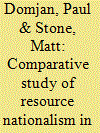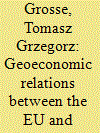| Srl | Item |
| 1 |
ID:
093714


|
|
|
|
|
| Publication |
2010.
|
| Summary/Abstract |
In neighbouring countries like Russia and Kazakhstan, resource nationalism that may look similar to outside observers has a different character and is driven by different circumstances in each state. To assess the underlying nature of state-centric models of resource-led development in the two post-Soviet states, we contrast recent state interventions into their respective resource sectors. In Russia, heightened state involvement in the resource sectors, including oil and gas pipeline networks, is characterised mainly by political goals, whereas Kazakhstan's resource nationalism is primarily motivated by economic goals. More specifically, Russia leverages its energy sector to achieve geopolitical objectives and domestic political stability. By contrast, Kazakhstan seeks widely dispersed economic development.
|
|
|
|
|
|
|
|
|
|
|
|
|
|
|
|
| 2 |
ID:
129594


|
|
|
|
|
| Publication |
2014.
|
| Summary/Abstract |
The merging of geopolitical and economic goals, known as geoeconomics, is becoming more and more frequently an important factor of state policies in the age of globalisation and the changing international order. The article offers an analysis of the EU-China relations seen within the increasingly valid geoeconomics perspective. It is focused on two case studies: armament embargo after 1989 Tiananmen Square protests and the Galileo system (a European system of satellite communication). The aforementioned cooperation has laid bare the weakness of European geopolitical thought. It has also demonstrated the supremacy of short-term economic goals of the European actors over strategic goals (both within the economic and the political spheres). In contrast with China, the EU does not possess a coherent geoeconomics strategy.
|
|
|
|
|
|
|
|
|
|
|
|
|
|
|
|
| 3 |
ID:
172687


|
|
|
|
|
| Summary/Abstract |
This article explicates the intertwined economic and political goals behind the imposition of countersanctions through an analysis of their premises and outcomes for Russia’s domestic economy. The evidence supports the argument that retaliation was designed to benefit the Russian domestic food industry, reorient trade relations, and bolster domestic public support for this sector while politically penalizing sanctioning countries. An important contribution of this article is to demonstrate how sanctions imposed on nondemocratic target countries, which play an important role in international affairs, is like a tit-for-tat game, which may have additional effects and also unintended political, economic, and social consequences not yet observed.
|
|
|
|
|
|
|
|
|
|
|
|
|
|
|
|